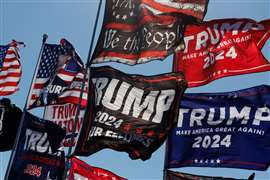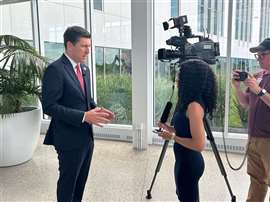US presidential election: What if Trump wins?
28 August 2024
The US presidential election has been neck and neck between former President Donald Trump and incumbent Vice President Kamala Harris. It’s been a tumultuous race so far, with an assassination attempt on Trump and the unprecedented withdrawal of incumbent President Joe Biden. What might a Trump victory mean for construction and equipment rental companies? Mitchell Keller breaks it down.
The US rental market is poised for continued growth, despite numerous economic uncertainties, not the least of which is the upcoming presidential race which concludes on Nov. 5.
Some industry experts say the election process itself is a headwind, while the outcome will have little effect in the long run; “The general rule of thumb is that election years are tough, uncertainty is not great for the construction industry,” says Josh Nickell, vice president, American Rental Association (ARA). “That being said, it usually doesn’t matter what happens. It’s just a question of, is it over and how can we react to the decision that’s been made?”
 Flags supporting Republican presidential nominee and former U.S. President Donald Trump blow in the wind as they are on sale by a roadside vendor in Fallbrook, California, U.S., August 27, 2024. (Photo: REUTERS/Mike Blake)
Flags supporting Republican presidential nominee and former U.S. President Donald Trump blow in the wind as they are on sale by a roadside vendor in Fallbrook, California, U.S., August 27, 2024. (Photo: REUTERS/Mike Blake)
He continues, “It often feels like, ‘If this happens or if that happens, things will get better or worse...’ But realistically, the market is pretty good at handling news, but it doesn’t like not knowing. We often see things start to slow down a little bit going into an election cycle.”
Still, many industry professionals wonder what the US economy, and specifically the construction market, will look like post election. The race was close leading up to the Democratic National Convention, held Aug. 19-22 in Chicago, with Harris now leading Trump by a slim margin in the latest polls.
Despite what general polling might currently suggest, the construction industry has traditionally leaned conservative. Should he secure a second term, what might Republican nominee Trump presidency mean for US construction and rental companies?
Potential expansion of tax cuts
One of the most substantial pieces of legislation passed by the Trump administration was the Tax Cuts and Jobs Act (TCJA), which became law in 2018, amending the US’ Internal Revenue Code of 1986.
The major implication for the construction industry came from a novel flat tax rate (21%) compared to a tiered tax rate that ranged from 15% to 39%, depending on the amount of a firm’s taxable income.
Portions of the tax law also favored companies with overseas operations. The law changed the US from a global to a territorial tax system in which each subsidiary of a company pays the tax rate of the country in which it is legally established (saving the difference between the US’ generally higher tax rate and the lower tax rate where the company is established).
Portions of the tax law are set to expire for individuals in 2025, however, the corporate tax cuts are permanent until (if ever) amendment by law.
Republican Governor of Virginia Glenn Youngkin said the party was eager to renew the TCJA. “We cannot let the Trump-Ryan tax cuts lapse,” said the governor, referring to then US Speaker of the House Paul Ryan, who championed the bill, which is now law.
Trump, if elected, would likely replace the expiring law with a new one (as it relates to individuals) or take steps to extend the existing law. Moreover, it’s possible a future President Trump could also entertain additional tax rate changes for corporations, though nothing has been signalled at this point in his campaign.
Ritchie said the uncertainty surrounding corporation taxes can create a freeze in business actions among some, while inspiring a flurry of mergers and acquisitions (MA) before the election.
“They’re uncertain what’s going to change,” Ritchie said. “You have a huge push for M&A to get it done, because you know what today’s market looks like.”
Trade policy and materials importing
A major initiative of the Trump presidency was implementing an ‘America First’ economic policy, which included shifting the country away from multilateral free-trade agreements and toward bilateral trade deals (the exchange of goods between two nations).
As part of this policy, Trump’s administration imposed sweeping tariffs on imported goods, particularly from China, including materials vital to the construction industry: solar panels, steel and aluminium. While nearly every country importing goods to the US was handed the tariffs, the most tariffs and the highest rates were levied on Chinese imports.
Party leadership made clear they still see an ‘imbalance’ between US imports and exports.
Republican Congressman of Wisconsin, Bryan Steil – at a policy panel held at a Komatsu facility in Milwaukee during the Republican National Convention – said, “We’ve had trade agreements that have been done
 US Congressman Bryan Steil of Wisconsin says not all trade agreements have benefitted American workers. (Image: Mitchell Keller)
US Congressman Bryan Steil of Wisconsin says not all trade agreements have benefitted American workers. (Image: Mitchell Keller)
not to the benefit of American workers in the past sometimes. And what we need to do is make sure that it’s free, fair, and reciprocal.”
Steil added, especially for manufacturers, encouraging exports of innovative products made in the US is the ultimate goal of the party’s trade policy.
“That US companies have access to foreign markets is a key piece of that, [and] I think that’s something that President Trump has been a great leader on.”
Free-trade proponents criticized Trump during his term and have continued to argue that Biden’s support of tariffs on imported Chinese materials is anti-competitive and hampering growth.
Michelle Ritchie, industrial products deals leader with global consultancy PwC, told Construction Briefing more tariffs could fuel already high inflation figures.
“We’ve been dealing with inflation, and if the tariffs start changing, it’s just going be the same thing, and we don’t see it as top of mind because it gets wrapped in the inflation,” explained Ritchie. “It is such a global economy from that perspective.”
As a result of the recent tariff fallout, Ritchie says she expects firms to keep investing in core services and products but to trim down elsewhere. “Particularly some of the largest contractors and even some of the larger home builders are talking about divestment, and it’s sometimes massive amounts,” she said.
While economic analysis of Trump’s tariff policy is mixed, there was (seemingly) a surprise proponent of it: Joe Biden.
Biden eased much of the Trump-era tariffs, particularly for governments of US allies, but he recommitted to imposing the charges on Chinese goods back in May. Biden not only kept alive the more than US$300-billion-worth of tariffs his predecessor implemented but added another $18 billion to a new list of Chinese goods incurring tariffs, including electric vehicles, batteries, semiconductors, solar cells, and ship-to-shore cranes.
While it is hard to project exactly what another round of a Trump-China trade war would look like, a Trump presidency is not expected to be too radically different in this respect than the current Biden administration, at least in the short-term.
Deregulation, particularly in environmental protections
Deregulation is arguably the most significant talking point to Republicans.
Ritchie at PwC said it was her sense that future changes to the tax code and industry deregulation were the “two biggest levers” of the upcoming election, but the latter was perhaps the most significant.
During Trump’s first term, deregulation of industry was a top priority, but no segments were as thoroughly relaxed as the energy and climate sectors.
Executive Order 13771 (2017) was one of the bluntest deregulation instruments utilized by Trump; it mandated that any executive department or agency of the government remove two regulations if it wishes to implement a new one. This order was rescinded by Biden on his first day in office, but if Trump were to win this November, the same executive order (or one similar) is nearly certain to resurface.
However, Ritchie cautioned that, even if Trump wins the presidency, a split Congress is less likely to pass extreme deregulation measures.
Additionally, topics like repealing the Davis-Bacon Act (DBA) – a US federal law regulating labor wages – can’t be undone unilaterally by a president. The law passed in 1931 establishes a requirement to pay prevailing wages to labourers on public-works projects.
At present, a legal challenge by the Associated General Contractors of America has suspended a Biden-era ruling on the DBA; in simplest terms, courts ruled that federal contracts must explicitly state DBA provisions and that they cannot be implied to cover all federal contracts. Further, the suspension pauses the need for businesses to pay prevailing wages to off-site material suppliers (including factory workers) and truck drivers.
While proponents of deregulating might be disappointed that the DBA is unlikely to be immediately and fully repealed, Ritchie noted a lot of contractors may actually find comfort in consistency.
“If the White House and Congress are not the same party, [contractors] feel a lot more comfortable that nothing will change, and then it’s just about business,” she added.
Industry adaptability
Ultimately, Ritchie said the industry is adept at adjusting to policy and will put its best foot forward regardless of who is in the Oval Office in 2025. But, until that happens, she said contractors are likely to protect and insulate their businesses in the coming months before the election, which could have downstream effects on equipment rental.
“It’s all about, not necessarily where the policies are going, because we can figure out policies and people can react to that, but it’s about uncertainty of the change, and that’s what’s pausing people,” she said.



